
The Delhi High Court has once again made it clear that protecting a company’s name and brand is a top priority, especially when it comes to trademark misuse and fraud. This was evident in the ongoing case involving a fake Burger King franchise website. The Court ordered these websites and emails to be shut down and the related bank accounts to be frozen, making it clear that such misuse of a brand will not be allowed. And if you want to know more about this case, keep reading.
Background of the Burger King Trademark Case in the Delhi High Court
The origin of this case goes back to 2022, when the world-famous food giant Burger King noticed something unusual. The company discovered that some fraudsters had created fake franchise websites to trick people. Many unsuspecting individuals ended up paying large sums of money, believing they were securing dealership or licensing rights.
The main reason ordinary people fell for the scam was that the fraudsters used similar logos, trademarks, and branding that closely resembled Burger King’s official identity. This gave the websites an appearance of authenticity and misled potential investors. Once the fraud came to light, Burger King did not hold back. The company filed a case in the Delhi High Court to protect its brand and stop the scammers from misusing its name.
Read Also: From Criticism to Trademark: Jordon Hudson’s “Gold Digger” Move With Belichick
What Burger King Alleged in Its Delhi High Court Lawsuit Against Franchise Scam
- Using Its Brand Without Permission
The fraudsters misused Burger King’s trademark without any legal right. This made people think the sites were officially connected to Burger King, when they were not, and made this case of trademark infringement.
- Running Fake Franchise Offers
The fraudsters set up look-alike websites claiming to give out Burger King franchises. They even sent people fake “approval letters” and then demanded about ₹2.65 lakh as an upfront fee, which went straight into their own bank accounts.
- Copycat Websites and Domains
The accused registered domain names like burgerkingindiafranchise.com, which looked almost identical to Burger King’s official website. This was done deliberately to mislead people.
- Cheating the Public and Hurting the Brand
Because of these scams, ordinary people lost their money and trust.
Delhi HC Protects Burger King Trademark, Suspends Scam Websites, and Freezes Bank Accounts
- The Delhi High Court gave the final judgment on August 20, 2025.
- Ordered suspension of fraudulent websites and email IDs used for fake franchise offers such as.
- burgerkingindiafranchisee.com
- burgerkingindiafranchise.com
- bk-india.co.in
- Instructed Bank of Maharashtra, Bank of Baroda, and Indian Overseas Bank to freeze bank accounts linked to the fraud and file compliance within one week.
- The court noted signs of fraud, such as the misspelling “Burger King Inida” and reactivation of earlier blocked sites.
Delhi HC Reinforces IP Rights in Burger King Trademark Scam
The Delhi High Court’s order in the Burger King fraud case highlights the strong protection of intellectual property rights (IPR) in India. By suspending fake websites, blocking scam emails, and freezing linked bank accounts, the Court showed that misuse of a trademark and brand identity will not be tolerated, safeguarding both the rights of the company and the trust of consumers.
Several big brands in India have faced scams similar to Burger King’s fake franchise case. For example, L’Oréal fought a fraudulent website that copied its name and documents to trick suppliers, while the Tata Group dealt with fake dealership sites misusing its brand and secured a dynamic injunction to block them. The Taj Hotels group faced a counterfeit booking site using its property images, and Kamats Restaurants had to shut down an unauthorized outlet using its name. In each case, the courts stepped in to protect trademarks, shut down scams, and uphold consumer trust.
Conclusion
The Burger King case shows how vital it is to protect trademarks and brand identity in today’s digital world. Courts in India have consistently stepped in to stop scams that misuse famous names, proving that strong legal action is key to safeguarding both businesses and consumers from fraud.
Read Also: Intel’s New SDC Patent: Merging Small Cores Into One Powerful Super Core
